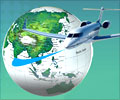Industry insiders have revealed that tourism companies are turning to travel bloggers as a route into the vast global market of social network users.

Catharina Fischer, of the German Tourism Office, said blogging opened up an effective and inexpensive way "to generate content, do marketing on social networks, expand one's presence, and all in different languages".
With the likelihood that a blogger will post YouTube videos or photos on Instagram to illustrate their post, it is easier to create a buzz on the Internet, via Twitter or Facebook, bloggers and companies say.
In today's world of real-time news and constant information, blogging, where an individual writes online about their own experience, offers an immediacy that traditional media and guide books cannot.
Marion Schumacher, of the Moevenpick hotel chain, also pointed out that a blog "is more subjective. It's often a first-person account by the blogger from their own experience."
"Bloggers mostly post their blogs online before, during and after a trip" which then remain on the Internet to be read time and again, explained Anja Beckmann, of specialist communication agency Red Mod.
Advertisement
- 'You don't buy my opinion' -
Advertisement
The guidelines on collaboration between bloggers and the travel industry still vary and have not been formalised -- some bloggers plainly state when a trip is financed by a travel company, while others do not.
Angelika Schwaff, a former head of international communication for an airline, launched her blog "Reisefreunde" ("Travelfriends") because she was always having to search back through business cards when asked for hotel or restaurant recommendations.
After around a year, her blog had attracted thousands of readers, and in 2012 she decided to leave her job and become a professional travel blogger --- still a privilege for the very few -- and consultant.
Today she says that 99 percent of her trips are down to partnerships with the travel industry but insists she retains her independence and always makes clear in her blog who has financed what.
"Even if they (partners) invite you on a trip, I make it very clear at the beginning in my letter of intent 'you don't buy my opinion'," she told AFP.
But for travel-lovers, blogging is a good way to fund their passion if they strike deals to get the travel or accommodation costs covered or are paid to provide photos or videos that can be used by the partner company.
Some agree to place adverts on their blog too.
But the role of the blogger and mutual benefits of blogging for a travel company can still be hard to define.
Sebastian Canaves, who is behind the off-the-path.com blog and works as a marketing consultant, grumbled about the avalanche of press releases he receives despite not being a journalist.
Even if the contours of blogging remaining relatively fluid, however, Yvonne Zagermann, of the blog justtravelous.com, said much had changed in blogging in the last two years.
"The blogosphere as a whole has made great progress in its professionalisation," she said.
Source-AFP








